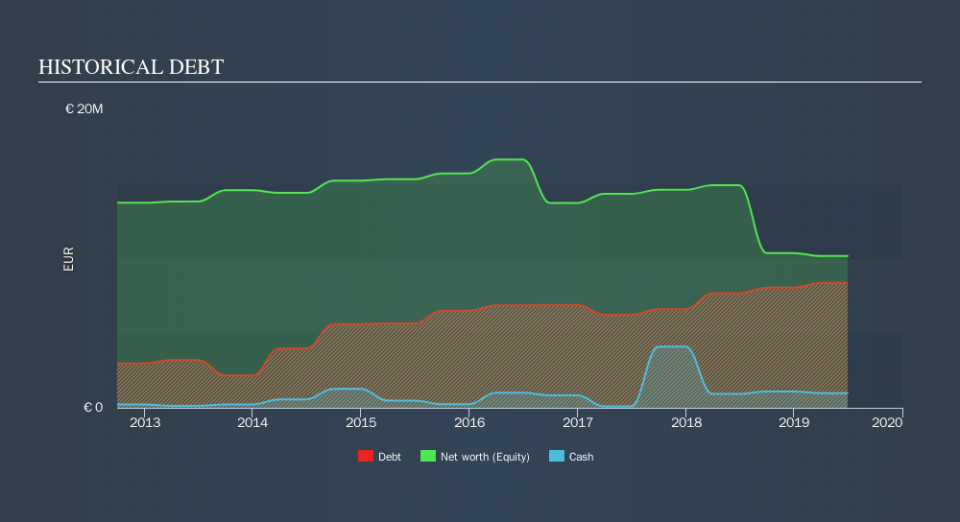Is Your Family Entertainment (FRA:RTV) Using Too Much Debt?

Some say volatility, rather than debt, is the best way to think about risk as an investor, but Warren Buffett famously said that 'Volatility is far from synonymous with risk. It's only natural to consider a company's balance sheet when you examine how risky it is, since debt is often involved when a business collapses. We can see that Your Family Entertainment AG (FRA:RTV) does use debt in its business. But the real question is whether this debt is making the company risky.
What Risk Does Debt Bring?
Debt is a tool to help businesses grow, but if a business is incapable of paying off its lenders, then it exists at their mercy. In the worst case scenario, a company can go bankrupt if it cannot pay its creditors. While that is not too common, we often do see indebted companies permanently diluting shareholders because lenders force them to raise capital at a distressed price. Having said that, the most common situation is where a company manages its debt reasonably well - and to its own advantage. The first thing to do when considering how much debt a business uses is to look at its cash and debt together.
View our latest analysis for Your Family Entertainment
How Much Debt Does Your Family Entertainment Carry?
As you can see below, at the end of June 2019, Your Family Entertainment had €8.37m of debt, up from €7.68m a year ago. Click the image for more detail. On the flip side, it has €982.2k in cash leading to net debt of about €7.39m.
How Strong Is Your Family Entertainment's Balance Sheet?
The latest balance sheet data shows that Your Family Entertainment had liabilities of €4.65m due within a year, and liabilities of €5.13m falling due after that. Offsetting these obligations, it had cash of €982.2k as well as receivables valued at €646.7k due within 12 months. So it has liabilities totalling €8.15m more than its cash and near-term receivables, combined.
This deficit is considerable relative to its market capitalization of €11.5m, so it does suggest shareholders should keep an eye on Your Family Entertainment's use of debt. This suggests shareholders would heavily diluted if the company needed to shore up its balance sheet in a hurry. The balance sheet is clearly the area to focus on when you are analysing debt. But you can't view debt in total isolation; since Your Family Entertainment will need earnings to service that debt. So when considering debt, it's definitely worth looking at the earnings trend. Click here for an interactive snapshot.
In the last year Your Family Entertainment wasn't profitable at an EBIT level, but managed to grow its revenue by2.8%, to €3.3m. That rate of growth is a bit slow for our taste, but it takes all types to make a world.
Caveat Emptor
Importantly, Your Family Entertainment had negative earnings before interest and tax (EBIT), over the last year. Its EBIT loss was a whopping €1.9m. Considering that alongside the liabilities mentioned above does not give us much confidence that company should be using so much debt. So we think its balance sheet is a little strained, though not beyond repair. We would feel better if it turned its trailing twelve month loss of €4.7m into a profit. So we do think this stock is quite risky. For riskier companies like Your Family Entertainment I always like to keep an eye on the long term profit and revenue trends. Fortunately, you can click to see our interactive graph of its profit, revenue, and operating cashflow.
Of course, if you're the type of investor who prefers buying stocks without the burden of debt, then don't hesitate to discover our exclusive list of net cash growth stocks, today.
We aim to bring you long-term focused research analysis driven by fundamental data. Note that our analysis may not factor in the latest price-sensitive company announcements or qualitative material.
If you spot an error that warrants correction, please contact the editor at editorial-team@simplywallst.com. This article by Simply Wall St is general in nature. It does not constitute a recommendation to buy or sell any stock, and does not take account of your objectives, or your financial situation. Simply Wall St has no position in the stocks mentioned. Thank you for reading.

